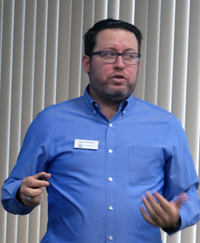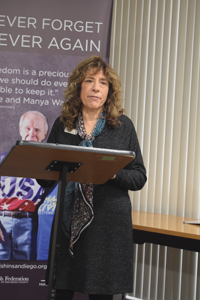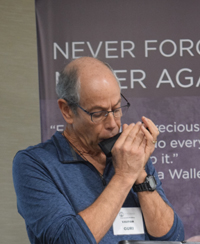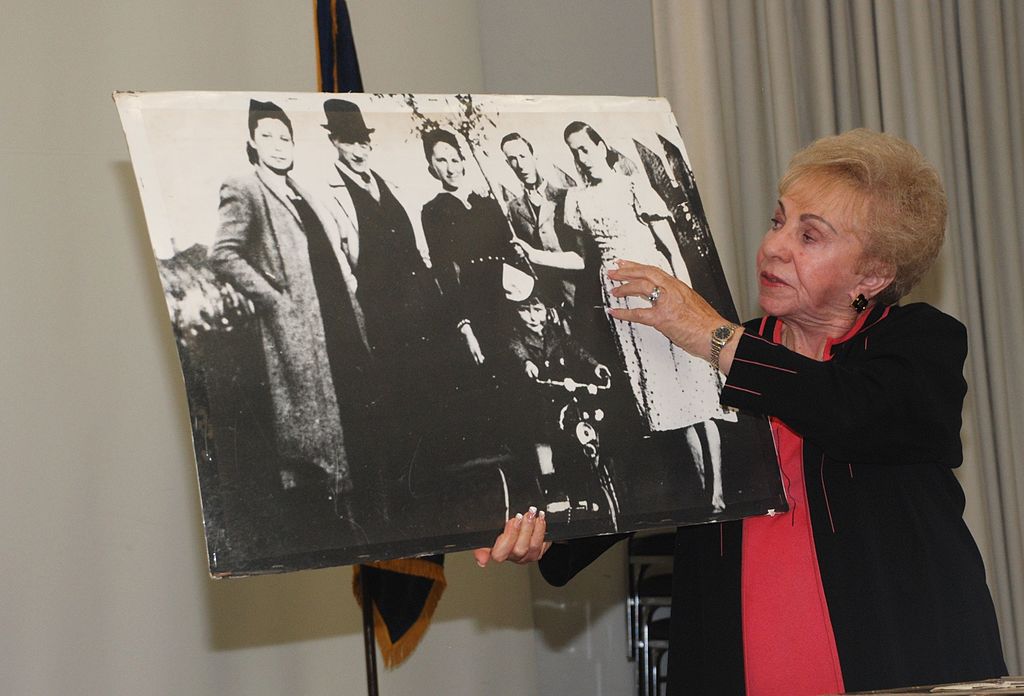True to its roots, when it was founded in 1936 to help European Jews who were being persecuted by the Nazi regime in Germany, the Jewish Federation of San Diego County on Tuesday, Dec. 3, launched a community-wide coalition to come to the aid and honor an estimated 500 Holocaust survivors who live in the county today.
Eighty-three years ago, when the then future U.S. District Court Judge Jacob Weinberger was the founding president of the United Jewish Fund, as the Federation was known then, the Holocaust was still in its initial, pre-Kristallnacht stages. Now, as the number of Survivors of the Holocaust diminishes on a daily basis, that ugly chapter in history is nearing its sad conclusion.
In a meeting attended by representatives of a diverse array of Jewish agencies, synagogues, and organizations, Michael Jeser, the Federation’s president and CEO, set the tone, declaring “We want a collective effort. Care of survivors is all of our responsibility.”
Darren Schwartz, the Federation’s chief program officer, said if local statistics mirror the national picture, approximately one-third of the survivors in this region live in poverty. That means that they need dental and medical care, transportation, home care, and an end to their isolation.

While people assume that the number of survivors who need help is fast diminishing, the opposite may be true, Schwartz said. Some people, who have tried to bury the Holocaust deep in their memories, may when beset by old age, frailty, reduced family support, and isolation, step forward in the next several years to ask for support.
Of the estimated 500 survivors in the county, approximately 150 are being helped through such agencies as Jewish Family Service, Seacrest Village, and the Coastal Roots Farm, Schwartz said. Overlapping to some extent with that group are 130 Survivors who are active in such organizations as the New Life Club, the Butterfly Project, Anti-Defamation League, and the Community Yom HaShoah observance.
There may be others who are receiving services from non-Jewish social service agencies, and some who are totally isolated, impoverished, and living in dire conditions.
Denise Selati told of a Survivor she called “Sara” who is in her mid-80s. “Sara” was born in Leipzig, Germany, immigrated to Buenos Aires, Argentina, and eventually came to San Diego with her husband. After her husband died, Selati reported, the woman’s life fell apart. Her annual income is $11,000. She lives in squalor. She is diabetic. She has no teeth. She has little food. She tries to make a head of cabbage last for her meals for three days. She is unable to shower herself. She has no friends. Her son lives in another state and has no contact with her.
“We need to look after our own; we all have a role to play,” Selati declared.

Hedy Dalin, director of care management at Jewish Family Service, said that although some Survivors might be eligible for payments from the Claims Conference that doles out reparations to Holocaust Survivors, many do not want to deal with the German government, nor to fill out the intrusive forms that are required of them to qualify for the grants. She added that many Survivors are Russian speaking, and that they need help from Russian-speaking volunteers who can translate for them, and accompany them to appointments.
Some Survivors were so traumatized by the Holocaust, they won’t acknowledge that they are Jewish, Dalin said. Some don’t want to go to elder care facilities because they associate any institutionalized living arrangement with the camps and prisons that they survived.
Schwartz said Jewish Family Service seeks to train bikkur cholim committees at the various synagogues and organizations on how to do wellness checks for these survivors.
He said the “San Diego Holocaust Coalition,” as the new group will be called, will seek to mobilize volunteers in behalf of the Survivors, combat their isolation, and work with the Survivors to inform the San Diego community about the Holocaust and its aftermath. He appealed to every Jewish synagogue, agency, and congregation to consider what each can do individually to better the lot of the Survivors.
He said pro bono contributions will be sought from individual professionals in various fields, such as law, accounting, medical, construction.
Jeser noted that the Federation had created a $100,000 Kavod fund to help defray the costs of filling Survivors’ most urgent needs. Within just a few months of its creation, he said, the fund has already spent $60,000. It is hoped that another $75,000 will draw matching funds to increase the amount available for emergency needs by $150,000.
Darren Schwartz will serve as the coordinator of the effort. Should anyone know of a Holocaust Survivor in need, or wish to volunteer, Schwartz has requested that he be contacted via this email.

The meeting began with musician and artist Guri Stark playing a harmonica version of the somber Yiddish song Undser Shtetl Brennt (Our Little Village is Burning) by Mordechai Gebiritg.
Groups represented at the meeting included Chabad of University City, Israeli American Council, Jewish Community Foundation, Jewish Family Service, Jewish Federation, Kahal Am – San Diego’s Humanistic Jewish Community, Lawrence Family JCC, Leichtag Foundation, Ner Tamid Synagogue, San Diego Generations of the Shoah, San Diego Jewish World, Seacrest Village, Shabbat San Diego, Temple Emanu-El, Tifereth israel Synagogue, and Torah High School.
Representatives signed a compact which read:
On this day in San Diego, and every day until the last of our Holocaust Survivors no longer remain, we the leaders of San Diego Jewish organizations and congregations enter into this covenant to support the physical, emotional, and spiritual needs of Holocaus Survivors in our midst.
We promise to recognize and treasure their uniqueness borne of tragedy and life circumstance.
We pledge to respond to their needs, when called upon, using the specific strengths and abilities of our organizations.
We commit to ensuring their final years are dignified, free from loneliness, and filled with love
We will seek to learn approaches that embrace culturally sensitive trauma informed care techniques.
We shall remain faithful through health and illness, joy and sorrow; mindful of how privileged we are to serve elders who embody our heritage and legacy.
We the undersigned joyfully embrace this opportunity to fulfill the mitzvot through tzedakah, gemulot chasadim and tikkun olam by personally pledging to seek out and care for Holocaust Survivors in our congregations for as long as they shall live.
Republished from San Diego Jewish World


























